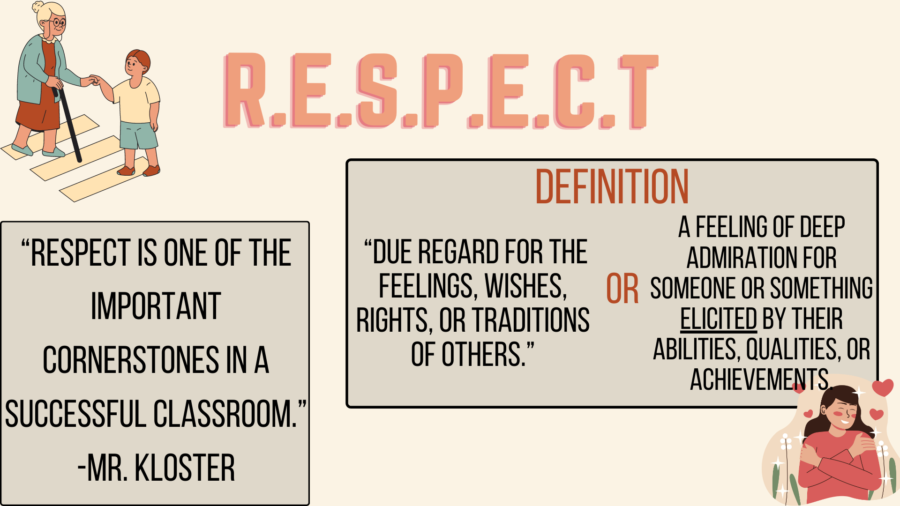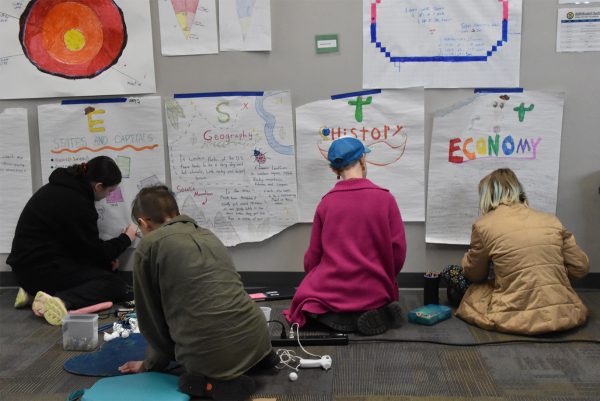What is respect and what is its role in school?
Respect is a word that is used a lot in the context of disobedient children or in regards to people in positions of authority. “Respect your elders!” How many times have children heard that phrase? The expectation that younger people follow this simple demand is hard to reach. Simply because it can be difficult to follow the instructions of that common phrase when your elders don’t respect you; when they feel a sense of entitlement simply because they are older.
The exact definition from Oxford Languages Dictionary of respect is as follows: “A feeling of deep admiration for someone or something elicited by their abilities, qualities, or achievements.” However, the second definition is this: “due regard for the feelings, wishes, rights, or traditions of others.” For ease of reading, the first definition will be categorized with a synonym of respect, ‘esteem’.
Respect is a tricky word. It’s a common and, in my opinion, correct sentiment that even strangers deserve a base level of respect. But, maybe respect isn’t the right word. Maybe it would be better defined as human decency, or politeness. Not cutting people off on the freeway, holding the door for someone directly behind you, saying ‘excuse me’. These are all things that are considerate for us to do as human beings.
Today, respect is thrown out as a word for acting kindly and politely to those around you, but it may be hard to see what people mean by that. Do they mean esteem, respect, or maybe some other term we haven’t considered? Our first definition goes deeper into that by saying “elicited by their abilities…” That brings the question of earning respect.
When asked, history teacher Colin Kloster described respect very similarly to the definition of esteem, saying “When I see somebody doing the right thing, that causes me to respect them. I see characteristics in them that I admire.”
Kloster also said that respect needs to be earned and that “Respect is one of the important cornerstones in a successful classroom.” This supports the idea that respect is esteem in many people’s eyes, or something close to it.
Older people, by definition, have more experience than children. However, that experience doesn’t necessarily mean wisdom or morality. They have lived more life, yes, but does that mean they automatically deserve the amount of respect they ask for?
English teacher Kiesha Blaser brings up an interesting point about this, with her definition of respect being “Treating people with kindness, making it clear in my actions that I care about them. Also, valuing what they have to say.”
She said that if someone doesn’t respect a person, it doesn’t mean they are disrespecting that person. “I don’t necessarily think it’s an either-or. Just because I don’t have respect for someone doesn’t mean I disrespect them,” said Blaser. Disrespecting someone, as the specific definition, means purposefully scorning or being rude to someone.
I asked administrators Travis Christensen, Amanda Quintus, and Josh Andres if I could interview them, and they responded to my questions as a collective over email. This is what they had to say: “If someone doesn’t respect someone but doesn’t have any real interactions with them I don’t know that someone would consider that disrespectful. However, if that same individual chooses to verbalize and carry out their lack of respect for that other individual then I could see that as being seen as disrespectful.”
They describe respect as “treating others and others’ property as you would hope that they treat you and your property.”
This topic has importance in school as well. Teachers are the elders of the students, and are in positions of authority. The school environment has teachers in a position where they control an entire classroom full of students. In a packed classroom, this inevitably means that students will talk over teachers, blatantly disobey orders, and bad-talk them when the student doesn’t get the grade they wanted.
“I don’t know if it falls into this respect conversation but there is a reality that school personnel are in positions of authority. I am not using authority in a way to describe power over someone else, but rather in a manner that describes the reality that a school personnel’s role is to make decisions that do impact students,” wrote the administration.
Do teachers deserve respect or esteem? In my opinion, at a base level, teachers deserve respect, just like everyone. Esteem comes with time and depends on each person and their definition of someone who deserves esteem. However, both esteem and respect are commonly defined by the same word. This means that when someone asks for respect, it can be difficult to tell which one they want.
The respect question goes both ways. Teachers can lack respect for students as well. This can present itself in many forms. One of the main ones is the assumption that the teacher’s specific class is the only thing that students focus on. They assign homework and studying and expect students to focus solely on that assignment. This is something I’ve experienced in past schools, especially with core teachers.
Core teachers have great importance, as the classes are required for everyone. However, the expectation that they are the main focus in a student’s life is not reasonable. This constitutes a lack of respect because they treat students as if they are only at school and don’t have a life outside of it. Exceptions are made when students talk to teachers personally, but I’ve found that some teachers don’t like to allow any extensions or retakes because ‘college is not this easy’. College and the preparation for it should not be the main focus of education, but that’s another thing entirely.
So the question of respect is still unanswered. I asked around in the commons to see student’s opinions.
“Right when you meet a new person, you know nothing about them, I’d say it’s in the middle. But the more you get to know about them you can really adjust where they are on the spectrum of respect,” said one junior student. However, this student also defined respect as treating people how you want to be treated, or the golden rule as we were taught in childhood.
So in the spirit of assumption, I’m going to assume most people have the two definitions of respect mixed as one in their mind. The base level of respect is defined as respect, but as someone gains more, they define it as esteem.
This brings us full circle. Schools should have a good amount of respect between the authority figures and the students. Teachers should be in control of their classrooms, but it should not be a dictatorship. All teachers deserve respect for what they do daily, but so do all students. If a student or teacher proves to be unworthy of that amount of respect, then that is a different story, and can be handled as such. But students should give teachers respect, and should expect it in return. Esteem can be earned and given, but respect at a certain level should be given to everyone automatically.
Lisa Metzger, the career expert in the counselor’s office, said this about student-teacher respect: “I think all people deserve respect, but I think some students think they deserve more respect even when they aren’t giving it to others.”
As Aretha Franklin said, R-E-S-P-E-C-T. Find out what it means to me. What she left out was: find out what it means to you and how you want to give it out.
Your donation will support the student journalists of Fargo North High School. Your contribution will allow us to resume physical printing of our newspaper for students at Fargo North!

I am an avid reader and writer, and love learning about what's going on in the world. I love experiencing the community in Fargo, and talking...









